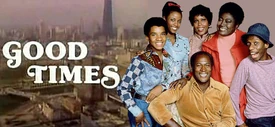| ||||
|---|---|---|---|---|
 Johnny Sekka in the Sidney Poitier-Bill Cosby comedy film "Uptown Saturday Night" (1974). | ||||
| Personal Information | ||||
| Gender: | Male | |||
| Birth name: | Lamine Sekka | |||
| Born: | July 21, 1934 | |||
| Birthplace: | Dakar, Senegal | |||
| Died | September 14, 2006 (aged 72) | |||
| Deathplace: | Agua Dulce, California, California, U.S. | |||
| Career/Family Information | ||||
| Occupation/ Career: |
Actor | |||
| Years active: | 1959-1986 | |||
| Spouse(s): | Cecilia Enger (1964-2006, his death) (1 child) | |||
| Character information | ||||
| Appeared on: | Good Times | |||
| Character played: | Ibe Wubila in "Thelma's African Romance: Part 1" (Season 4) and "Thelma's African Romance: Part 2" (Season 4) | |||
Johnny Sekka (born Lamine Sekka) appeared as Ibe Wubila, a Nigerian exchange student who begins dating fellow college student Thelma in the Season 4 episode of Good Times titled "Thelma's African Romance: Part 1" and "Thelma's African Romance: Part 2".
Life and career[]
Johnny was born in Dakar, Senegal to a Gambian father, who died shortly after his birth, and a Senegalese mother. When he was still very young, his mother sent him to live with an aunt in Georgetown (now Janjanbureh) in the Gambia, but he ran away to live on the streets in the capital, then known as Bathurst (now Banjul). In the Second World War, he worked as an interpreter at an American air base in Dakar. He then worked on the docks. When he was 20, he stowed away on a ship to Marseilles, and lived for three years in Paris.
He arrived in London, England in 1952, and served in the RAF for two years, but then Caribbean actor Earl Cameron persuaded him to become an actor, and he attended RADA. He became a stagehand at the Royal Court Theatre, and appeared on stage in various plays from 1958. He had a small part in the 1958 film version of Look Back in Anger, directed by Tony Richardson, who had seen him on stage. Johnny then took a leading role in the 1961 film Flame in the Streets, playing the Jamaican boyfriend of the (white) daughter (played by Sylvia Syms) of a liberal working-class trades unionist (played by John Mills). He lived for a period in Paris, where he met his wife, Cecilia Enger.
He continued in British films during the 1960s, portraying stereotypical roles, such as a butler in the film Woman of Straw (1964), and in other films, such as East of Sudan (1964), Khartoum (1966) and The Last Safari (1967). He also appeared on television, in programmes such as Z-Cars, Dixon of Dock Green, Gideon's Way, Danger Man AKA Secret Agent Man, and a 1968 episode of The Avengers. In 1968, he also played the lead role in a West End production of Night of Fame. According to his obituary in The Times, this was the first time that a black actor had played a role written for a white man in English theatre. He was seen as a British equivalent to Sidney Poitier, and was frustrated that actors who started out at around the same time as him - such as Sean Connery, Terence Stamp, Michael Caine, Tom Courtenay and John Hurt - had become stars, and he had not. After moving to the U.S., he began getting steady work immediately, getting much better film and TV roles.
Johnny had a minor part in the films A Warm December (1972) and Uptown Saturday Night (1974), both directed by Poitier. The first also featured Earl Cameron and the second Bill Cosby and Richard Pryor. These roles led to his role in the sitcom Good Times, where he portrayed Ibe Wubila, Thelma's former Nigerian fiance. In 1976, he starred in the movie Mohammad, Messenger of God (also known as The Message) about the origin of Islam and the message of Muhammad, in which he played Muhammad's Ethiopian disciple Bilal al-Habashi. He appeared in the 1982 film Hanky Panky.
He was not cast in Roots (1977), being considered insufficiently American, but secured a role in the sequel, Roots: The Next Generations (1979), playing an African interpreter. Sekka is widely known among science fiction fans for his role as Dr. Benjamin Kyle in the television series Babylon 5's pilot movie, The Gathering (1993). Recurring health problems forced him to decline a future role in the series, and ultimately were the reason he retired from acting altogether.
Death[]
Sekka died of lung cancer at his ranch in Agua Dulce, California, aged 72, survived by his wife Cecilia and son Lamine. [1]
References[]
- ↑ Obituary by Kaye Whiteman, The Guardian, 29 September 2006.
External links[]
- Johnny Sekka article at Wikipedia
